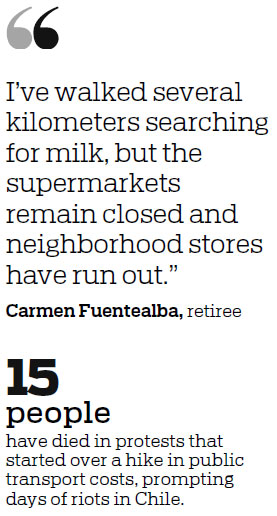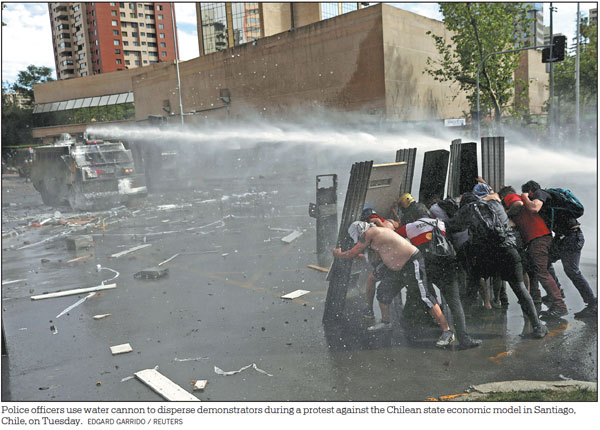Pinera unveils measures to stem protests
SANTIAGO, Chile - Chilean President Sebastian Pinera announced measures on Tuesday aimed at stemming days of protests over economic inequality that have swept the country and claimed 15 lives.
Apologizing to the nation for failing to anticipate the outbreak of social unrest, Pinera said his government had "received with humility and clarity the message Chileans have given us".

He vowed to increase the universal basic pension by 20 percent, cancel a recent 9.2 percent increase in electricity bills and proposed a law that would see the state cover the costs of expensive medical treatment.
"I recognize this lack of vision and I apologize to my compatriots," Pinera said in an address from the presidential palace in Santiago.
Pinera also pledged a state subsidy to increase the minimum wage to 350,000 pesos ($482) a month and said the government would introduce health insurance for medications, which are among the most expensive in the region.
Earlier in the day, the president met with the leaders of some of Chile's opposition parties as he sought a way to stem the country's worst violence in decades, initially triggered by an increase in metro fares.
The protests, which began on Friday, mushroomed into a broader outcry against social and economic woes, including a yawning gap between rich and poor in a country normally considered one of the most stable in Latin America.
Pinera quickly suspended the metro fare hike, but also declared that Chile was "at war against a powerful, implacable enemy", and imposed a state of emergency in Santiago and most of Chile's 16 regions.
Adopting a more conciliatory tone, he later called for Tuesday's meeting, which was boycotted by three of the largest opposition groups, including the powerful Socialist Party.
The day's protests were mostly peaceful, particularly in the capital, although looting continued in other towns.
Riot police used tear gas and water cannons on Tuesday to break up marches by rock-throwing demonstrators in several parts of Santiago, while soldiers and police guarded other Chileans who formed long lines at supermarkets.
"I've walked several kilometers searching for milk, but the supermarkets remain closed and neighborhood stores have run out," said Carmen Fuentealba, a retiree.
Stores burned
Many stores, subway stations and banks were burned, damaged or looted during protests over the weekend, and some people have reported problems getting cash at ATMs.
The protest violence - widespread looting, arson and clashes with the 20,000 security forces deployed on the streets - is the worst to hit Chile since 1990.
On Tuesday, the army announced a nighttime curfew - from 8 pm to 5 am - for the fourth day in a row.
Before Pinera's announcement, one of Chile's largest conglomerates, Quinenco, decided to act swiftly and promised to increase its minimum salaries to 500,000 pesos a month from Jan 1 - 60 percent more than the current minimum wage of 301,000 pesos.
Chile's big business conglomerates are a major factor in the huge wealth disparity that has angered protesters.
A 55-year-old man taking part in Monday's protests, who gave his name only as Orlando, said low salaries and pensions, waiting lists at hospitals and high prices for medicine, were the real reasons for the protests.
Many Chilean families earn $550 to $700 a month and monthly pension payments can be as low as $159, The Associated Press reported.
The government started naming some of the dead on Tuesday. Nine had died in fires, one was electrocuted and five were shot, four of those by the security forces.
Eleven of the fatalities were in the Santiago region. A Peruvian and an Ecuadorian were among the dead.
Since the unrest began, more than 2,600 people have been detained.
Agencies

(China Daily 10/24/2019 page11)














